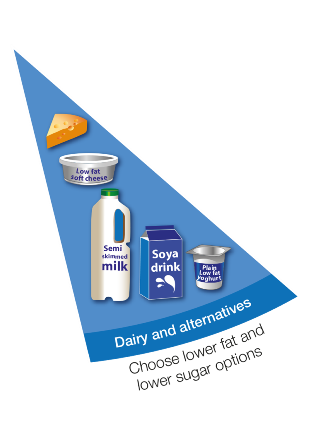In this article, you will find information for the general public who are interested in knowing about healthy eating and dairy and alternatives in the diet.
This category is an essential part of a safe, balanced diet, since these foods are good protein sources and vitamins. However, they are an essential source of calcium and iodine in the UK most notably.Calcium is particularly good for us in dairy products, as our bodies quickly absorb it. Aim to use lower sugar and fat varieties of milk products and beverages as certain saturated fat and Sucre choices can be high.

Why we eat these diets?
These foods provide a range of nutrients:
- Calcium – for the development and maintenance of strong, healthy bones.
- Protein – for growth and repair function.
- Iodine – important for healthy nerve and brain function, and healthy skin.
- Vitamin B12 – for healthy red blood cells and nerve function.
- Vitamin B2 (riboflavin) – to help release energy from carbohydrate and protein.
What counts?
- Milk
- Cheese
- Yogurt
- Fromage frais
- Cream cheese
- Quark
- Dairy calcium-fortified alternatives to these foods, such as soya drinks, soya yogurts, and oat, nut and rice milks.
What about dairy alternatives?
If purchasing dairy alternatives, it is important to try and choose unsweetened, calcium-fortified versions.
Some people need dairy alternatives for various reasons:
| Cows’ milk allergy Cows’ milk allergy is an immune response to cows’ milk protein. This is relatively rare in adults, and is mainly a condition in younger children. Generally, many will outgrow their milk allergy before they begin school. Individuals with cows’ milk allergy need to avoid milk and dairy products. |
| Lactose intolerance Lactose intolerance is not the same as cows’ milk allergy. It is a digestive problem where the body is unable to digest lactose, a type of sugar found in milk and dairy products. The symptoms of this condition can include bloating and diarrhoea. Quite often, people with lactose intolerance can consume a small amount of milk but need to be careful about how much they have. |
Choosing lower fat and lower sugar versions

Although dairy products are an important part of a healthy, balanced diet, some can be high in saturated fat and sugar.
Having a high fat diet makes it easy to consume too many calories and, over time, can lead to weight gain. As well, having too much saturated fat in the diet can cause raised levels of cholesterol in the blood, which may increase the risk of a heart attack or stroke.
So, we need to consider:
- Lower fat versions – We should be trying to opt for these products such as lower-fat milks (semi-skimmed, skimmed or 1% fat) and reduced or lower fat cheeses (cottage cheese or quark) and lower fat yogurts.
- Lower sugar versions – We should be trying to opt for lower-sugar products such as lower sugar or plain yogurt.
- Food labels – these lower fat and lower sugar dairy foods and drinks are widely available. Using food labels to look out for the fat, saturated fat, sugar and salt content can help you make healthier choices!
- Quantity – Use less of standard versions, for example choosing a strong flavoured cheese (e.g. mature cheddar or parmesan) to make a sauce. Or grate the cheese instead of slice – this way you can avoid using more than you need.
Supports your Bones
Calcium is the main mineral in your bones — and dairy is the best source of calcium in the human diet.
Therefore, dairy has many benefits for bone health.
In fact, most health organizations recommend that you consume 2–3 servings of dairy per day in order to get enough calcium for your bones
Despite certain claims you may hear, there is no conclusive evidence that dairy intake has adverse effects on bone health (16Trusted Source).
Most evidence indicates that dairy improves bone density, reduces osteoporosis and lowers older adults’ risk of fractures
Additionally, dairy provides more than just calcium. Its bone-boosting nutrients include protein, phosphorus and — in the case of grass-fed, full-fat dairy — vitamin K2.
https://www.healthline.com/nutrition/is-dairy-bad-or-good

